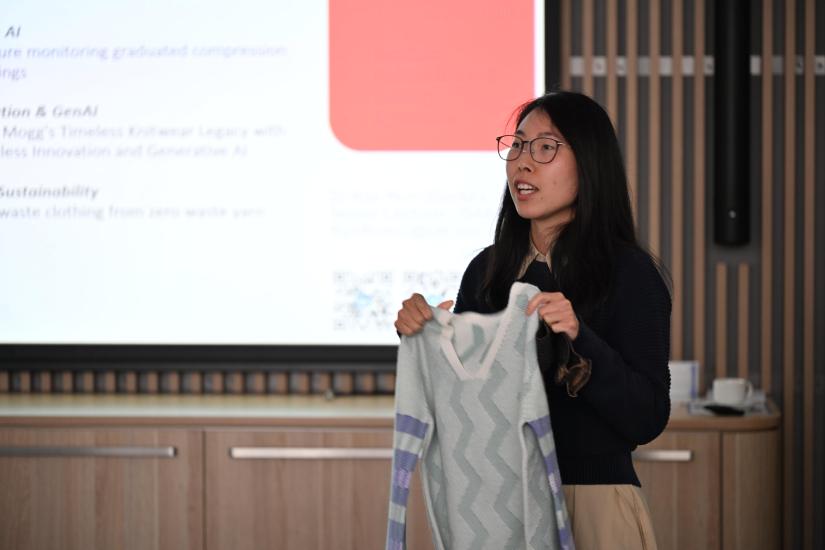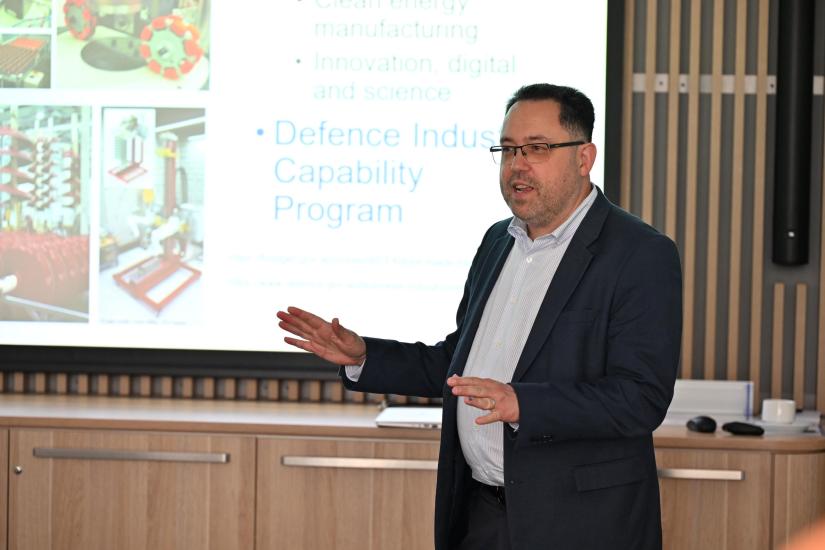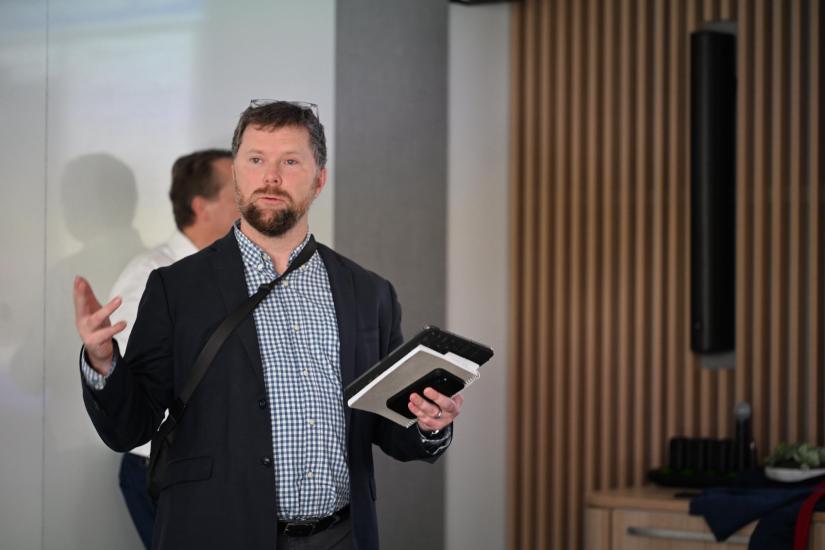In this week’s Research Cafe, we discussed the opportunities of manufacturing and how UTS is a key player in the “made in Australia” future.
Research translation: made in Australia

Dr Doris Li speaking at Research Cafe
Host Professor Chris Turney, Pro Vice-Chancellor Research, opened the Cafe conversation by asking how the university’s research capabilities can better respond to a growing demand for locally produced, advanced manufacturing solutions.
He discussed the potential of universities to partner with industries in delivering research innovations that address critical national priorities.
Chris noted that sometimes the concept of “research opportunities in manufacturing” remains unclear, with varying interpretations across sectors.
“Ask 50 different people about research opportunities in manufacturing and you’ll get 50 different answers,” he said, pointing to the need for greater clarity and alignment on what the term means for the UTS research community.
Michael Blumenstein, Pro Vice-Chancellor of Business Creation & Major Facilities, followed up by stressing the importance of understanding industry perspectives.

“To our industry partners, when we talk about manufacturing, we’re talking about making money,” he explained, referring to the valuable potential of university research translating into commercial success for both parties.
Michael said UTS is already making great strides in this direction, particularly through initiatives like UTS Rapido that accelerate the journey from lab research to industry application.
He discussed two Rapido case studies:
- a novel conveyor sortation system with potential to disrupt the global logistics sector. Discover the OMNIA™ Wheel
- a 3D-printed spiral structure for use in mineral technologies to improve waste separation on mine sites.
With both prototypes now being sold and utilised, they demonstrate the tangible outcomes of UTS research. Learn more about Rapido.
When we think about manufacturing as a university, we should always be thinking about what the outcomes might be for industry, the economy and society.
“When we think about manufacturing as a university, we should always be thinking about what the outcomes might be for industry, the economy and society,” Michael said, addressing future opportunities emerging from the Federal Government’s manufacturing agenda. He also highlighted areas where UTS has demonstrable research strengths such as clean energy manufacturing, health and defence.
Next up, Doris Li from the Faculty of Design, Architecture and Building (DAB) discussed how UTS is utilising state-of-the-art seamless knitting technology across fashion, health, engineering and wearable sensor design.
Doris explained how the latest model Shima Seiki WHOLEGARMENT knit machine allows for seamless, whole garment creation with almost zero waste and off cuts. The first of its kind to be installed in a university setting anywhere in the world, and the only machine in the Southern Hemisphere, it’s a technology that increasingly attracts interesting research opportunities.
Current collaborations include projects to develop suits for astronauts and Formula One drivers. Others are investigating knitted approaches to furniture, green buildings and pressure bandages, underscoring UTS’s capacity for interdisciplinary innovation. Learn about research translation at DAB.

Matthew Proft, UTS Precincts Director, reflected on opportunities for UTS to leverage its connections to Greater Western Sydney, home to some 30% of current UTS students.
“How might we better embrace the fact that about a third of our students come from Greater Western Sydney?” he asked. “We are so well networked across the greater city. What can we do to use these connections to realise opportunities in advanced manufacturing?”
Matthew was invited to support Dai Li, the member for Fowler, in an advanced manufacturing roundtable in her electorate, a collaboration that led to a process of mapping business capability in Wetherill Park industrial area.
“We have identified around 100 manufacturers crammed into an area of six square kilometres, about the same size as the Tech Central area we are in today,” he explained.
Many of these manufacturers are highly relevant to UTS research, contributing products and services from metal machining and component manufacturing to packaging, package manufacturing and food manufacturing.
“There are some really interesting opportunities that we'd like to explore around how we might better utilise our existing networks and facilities to engage manufacturers across Greater Sydney,” Matthew said.
It’s now about bringing it all together. It’s about deciding what we want to do, what society needs us to do, and how we can make that happen.
In closing, Chris reflected on the untapped potential of universities to drive the manufacturing agenda forward with research knowledge in areas that are integral to the government’s vision for boosting productivity, job creation and national sovereignty through advanced manufacturing.
“We have the research, the teaching and great students,” he said. “It’s now about bringing it all together. It’s about deciding what we want to do, what society needs us to do, and how we can make that happen.”
With its diverse expertise, longstanding industry partnerships and commitment to collaboration, UTS is well-positioned to respond to the growing demand for advanced manufacturing solutions as expressed in the Australian Government’s Future Made in Australia strategy. How we align our research capabilities with national priorities to take up the opportunities on the horizon will continue to offer exciting prospects for our researchers and students as well as the broader economy.
The fortnightly Research Cafe is an informal opportunity for the UTS research community to share ideas, make connections and explore opportunities for collaboration. Come along for pastries, coffee, tea and real conversations!